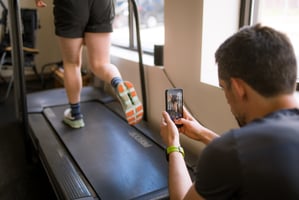Each year, 80% of runners experience overuse injuries, which include various tissues like muscles,...
Stop Doing This to Decrease Your Running Injury Risk by 1.7 Times…
Stop doing this to decrease your running injury risk by 1.7 times…
When it comes to optimizing running performance, the most underrated thing you can do is to stay consistent with your training.
What is the main thing that disrupts consistent training? Getting injured. Up to 80% of runners get a running injury every year!
Now imagine how your running would feel if you could go just a year or 2 without getting injured.
While injury prevention, especially relating to running injuries, is very multifactorial, there is one small thing that you can do to decrease your risk by 1.7 times…sleep!
A recent meta-analysis by Cook & Cherest found that getting less than 7 hours of sleep for 14 days in a row increases your risk of injury by 1.7 times.
We commonly have runners ask us if they should use a sauna more or take more ice baths to help their performance or recovery. While these things could help, the amount is miniscule compared to 1.7 times change.
Our advice: it’s fine to try all of the smaller things that may make small differences. But it’s only worth the time and money doing these things if you’re taking the larger things seriously.
Okay - your point is clear - I know I should emphasize sleeping more.
The hard part is choosing to say no to other things in order to prioritize your sleep. We struggle with this too! Balancing spending more time with your kiddos, reading, relaxing, being with your spouse, & seeing friends can be a lot. It’s easy to get sucked into reading/watching something on our phones or continue scrolling. But our hope is that by spreading stats like these, we all can collectively take our injuries into our own hands a bit more and change our habits to emphasize the things that we care most about.
For many of us that is running in some capacity, and wanting to continue to run for as long as we live. With this goal in mind we must also emphasize the main things that help us stay injury-free to ensure we have the ability to run for life.
I’ve summarized a few many takeaways from the meta-analysis referenced above around sleep and its impact on athletic performance.
Sleep Less Than 7 Hours Increases Injury Risk: Runners who consistently sleep less than 7 hours per night have a 1.7 times higher risk of injury. Adequate sleep is crucial for muscle recovery and reducing inflammation, which helps us stay out on the roads and trails.
Hormonal Balance and Muscle Repair: Deep sleep stages promote the release of growth hormone, which is essential for muscle repair and recovery. Poor sleep disrupts this process, leading to impaired healing and a higher likelihood of injuries, particularly overuse injuries common in runners.
Consistency in Sleep Schedule Matters: Maintaining a regular sleep schedule helps regulate the body's circadian rhythm, optimizing recovery and performance. Inconsistent sleep patterns can increase the risk of injury due to inadequate recovery time, even if the total sleep time remains the same.
Quality Over Quantity: It’s not just about getting enough hours of sleep but also the quality. High sleep efficiency and shorter sleep latency (time to fall asleep) are linked to better recovery, reduced soreness, and lower injury risk, helping runners stay consistent in their training.
Mental Health and Sleep Connection: Poor sleep can worsen anxiety, stress, and depression, which negatively impact focus and motivation. These can also contribute to us running more when it could be too much for our bodies’ current recovery state, ultimately leading to a higher chance of injury.
Sleep Extension Enhances Performance: Extending sleep can reduce reaction times, improve decision-making, and enhance overall performance. For runners, this means sharper focus on the trails, better pacing, and a more responsive body, all of which contribute to injury prevention.
Sleep Deprivation and Fatigue: Chronic lack of sleep leads to increased fatigue, affecting coordination, balance, and endurance. This increases the risk of missteps, poor landing mechanics, and muscle strains, which are common injury causes among runners.
Recovery and Immune Function: Sleep supports immune function, which is vital for recovering from both training sessions and minor injuries. A well-rested body is better equipped to fight inflammation and repair damaged tissues, crucial for rehabbing injuries.
Practical Tips for Better Sleep: Practices like maintaining a consistent bedtime, creating a dark and cool sleeping environment, and avoiding screens before bed can significantly improve sleep quality and aid in injury prevention and recovery.
I hope you’ll join us in our never-ending pursuit of improved recovery via sleep optimization!
-Kelton




